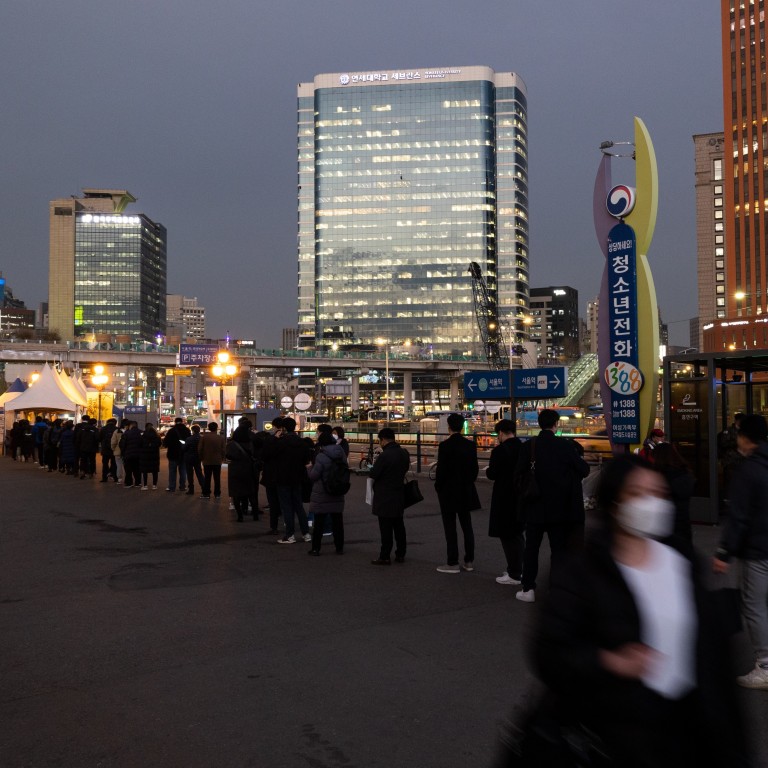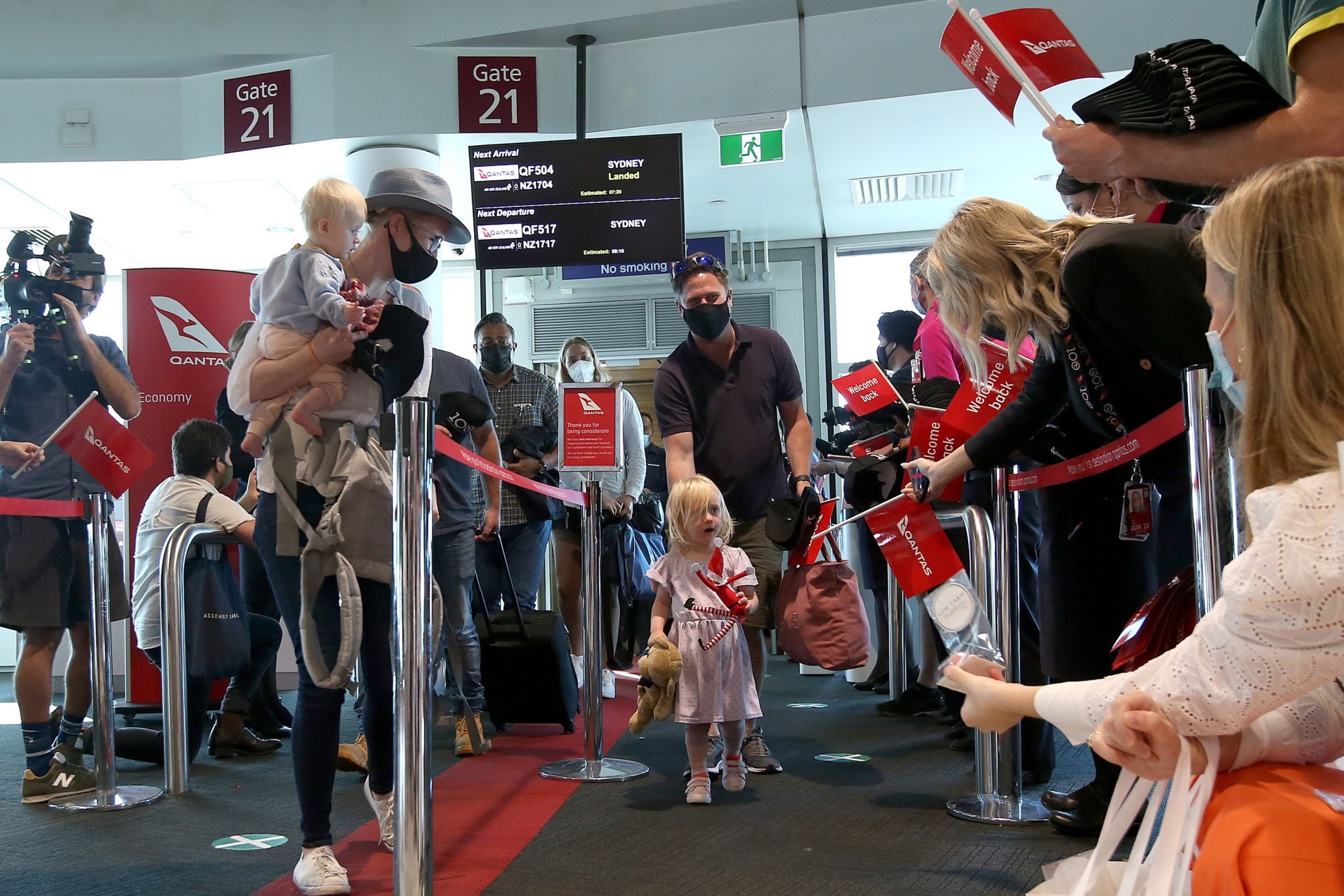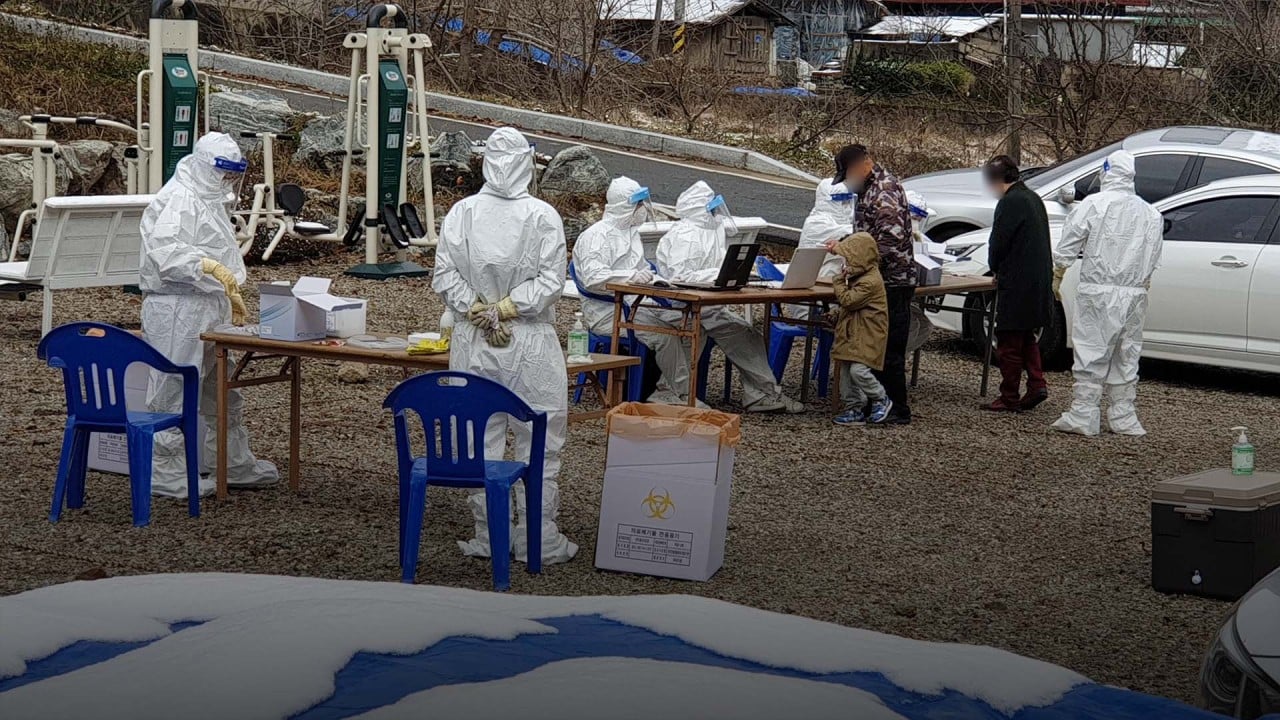
Coronavirus: South Korea to use facial recognition tech to track cases
- The pilot project in Bucheon will use AI algorithms to analyse footage gathered by more than 10,000 CCTV cameras and track an infected person’s movements
- The initiative will become operational in January despite concerns about the invasion of privacy
The nationally funded project in Bucheon, one of the country’s most densely populated cities on the outskirts of Seoul, is due to become operational in January, a city official said.
The system uses an AI algorithms and facial recognition technology to analyse footage gathered by more than 10,820 CCTV cameras and track an infected person’s movements, anyone they had close contact with, and whether they were wearing a mask, according to a 110-page business plan from the city submitted to the Ministry of Science and ICT (Information and Communications Technology), and provided to Reuters by a parliamentary lawmaker critical of the project.
Governments around the world have turned to new technologies and expanded legal powers to try to stem the tide of Covid-19 infections. China, Russia, India, Poland and Japan as well as several US states are among the governments to have rolled out or at least experimented with facial recognition systems for tracking Covid-19 patients, according to a March report by Columbia Law School in New York.
Why it’s too early to panic about Omicron’s ability to evade vaccines
The Bucheon official said the system should reduce the strain on overworked tracing teams in a city with a population of more than 800,000 people, and help use the teams more efficiently and accurately.
South Korea already has an aggressive, hi-tech contact tracing system that harvests credit card records, mobile phone location data and CCTV footage, among other personal information.
It still relies, however, on a large number of epidemiological investigators, who often have to work 24-hour shifts, frantically tracing and contacting potential coronavirus cases.
In bidding for national funding for the pilot project in late 2020, Bucheon mayor Jang Deog-cheon argued that such a system would make tracing faster.
“It sometimes takes hours to analyse a single CCTV footage. Using visual recognition technology will enable that analysis in an instant,” he said on Twitter.
The system is also designed to overcome the fact that tracing teams have to rely heavily on the testimony of Covid-19 patients, who aren’t always truthful about their activities and whereabouts, the plan said.
The Ministry of Science and ICT said it has no current plans to expand the project to the national level. It said the purpose of the system was to digitise some of the manual labour that contact tracers currently have to carry out.
The Bucheon system can simultaneously track up to 10 people in five to 10 minutes, cutting the time spent on manual work that takes around half an hour to one hour to trace one person, the plan said.
The pilot plans call for a team of about 10 staff at one public health centre to use the AI-powered recognition system, the official said.
Bucheon received 1.6 billion won (US$1.36 million) from the Ministry of Science and ICT and injected 500 million won of the city budget into the project to build the system, the Bucheon official said.
While there has been wide public support for existing invasive track and trace methods, human rights advocates and some South Korean lawmakers have expressed concerns that the government will retain and harness such data far beyond the needs of the pandemic.
“The government’s plan to become a Big Brother on the pretext of Covid is a neo-totalitarian idea,” Park Dae-chul, a lawmaker from the main opposition People Power Party, said.
“It is absolutely wrong to monitor and control the public via CCTV using taxpayers’ money and without the consent from the public,” Park said.
The Bucheon official said there are no privacy concerns because the system places a mosaic over the faces of anyone who is not a subject.
“There is no privacy issue here as the system traces the confirmed patient based on the Infectious Disease Control and Prevention Act,” the official said. “Contact tracers stick to that rule so there is no risk of data spill or invasion of privacy.”
Rules say patients must give their consent for the facial recognition tracking to be used, but even if they don’t consent, the system can still track them using their silhouette and clothes, the official said.
The Korea Disease Control and Prevention Agency (KDCA) said the use of such technology is lawful as long as it is used within the realm of the disease control and prevention law.
More border rules ease in Australia
Coronavirus-free Queensland state opened its domestic borders to all vaccinated people on Monday for the first time in nearly five months, as Australians gear up for quarantine-free travel across most of the country during the busy Christmas period.
Hundreds of cars queued up at the state’s southern border with New South Wales (NSW) well before the rules were set to relax at 1am (local time), television footage showed.
Queensland shut its border to New South Wales in July and then later to people coming from Victoria to protect against a Delta outbreak that rocked the country’s east for several months.
“We will live with Covid – but on our terms,” state Premier Annastacia Palaszczuk said in a tweet as the state topped its goal of having 80 per cent of people over 16 fully vaccinated – a prerequisite for relaxing rules.

Qantas said it would fly nearly 10,000 passengers to and from Queensland on Monday in about 100 flights, with most fully booked.
Australian states have been relaxing border rules after reaching higher vaccination levels despite the threat from the new Omicron variant.
Tasmania is set to reopen its borders to other states later this week, while Western Australia announced it will welcome fully vaccinated international and domestic travellers from February 5. Overseas arrivals without protection will still have to quarantine. South Australia has been receiving interstate arrivals since late November.
Australia on Monday reported its first hospitalisation from the Omicron variant, according to NSW health officials.
The state has found at least 64 cases of the new variant stemming from outbreaks in western Sydney, nightclubs and a party cruise on Sydney Harbour.
Australia has recorded nearly 229,000 virus cases and 2,104 deaths, far fewer than many comparable countries.
Indonesia to vaccinate children aged 6-11
Indonesia approved China’s Sinovac Biotech vaccine for the age group last month and about 26.5 million children have been targeted for vaccination, Maxi Rein Rondonuwu, a senior health ministry official, told a briefing.
The Sinovac vaccine is the only shot approved for children in Indonesia and Maxi said from next year authorities would restrict its use only for this age group.
“This is being done to accelerate vaccinating everyone in Indonesia … we’re strengthening herd immunity,” Maxi said in comments made on Sunday, noting vaccinations of 6-11 year olds will start in the Greater Jakarta area.
In Asia, China has already started vaccinating children aged three and above, while Cambodia administered its first vaccines for children aged 6-12 in September. Singapore said last week it would start vaccinating children aged 5-to-11 before the end of this year.
Indonesia has suffered one of Asia’s most serious outbreaks of Covid-19, but in recent months infections have plummeted, with a daily average of about 400 last month compared to about 40,000 in July.
The country has fully vaccinated about 38 per cent of its total population of 270 million people. Indonesia also uses the Moderna, Pfizer-BioNTech and AstraZeneca vaccines.
How the world is getting tough on unvaccinated people
Auckland to relax curbs at year-end
New Zealand’s largest city Auckland will ease some coronavirus restrictions in time for New Year’s Eve. From 11.59pm on December 30, capacity limits on hospitality venues will be lifted and more close-contact activities such as dancing will be allowed.
People still require vaccine passes to enter most venues and events and must wear masks in most public facilities and shops.
Auckland was plunged into a strict lockdown in mid-August to combat an outbreak of the Delta variant. The 107-day lockdown ended on December 3, and a border around the city is due to lift on December 15, allowing residents to visit other parts of the country as the summer vacation period approaches.
Reporting by Reuters, Bloomberg

